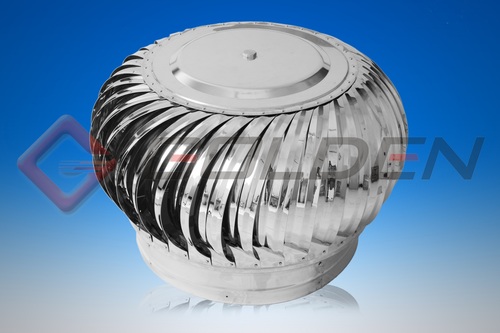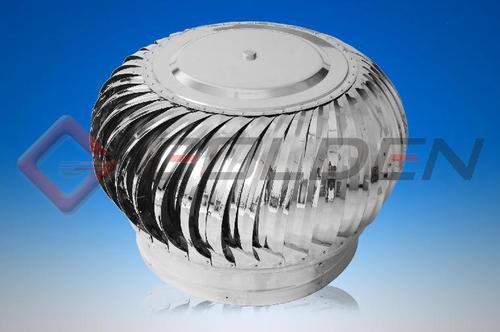Product Description
We are a reliable enterprise, successfully engaged in providing top-grade Aluminum Air Ventilator in standard and customized specifications. This ventilator is assembled with supreme grade center shaft, turbine, inner arms as well as base ring. The offered ventilator is used for removing harmful air from work place. Mostly preferred as efficient medium of ventilation, the provided product can be availed at most economic prices from us.
Aluminum Air Ventilator Features:
- Hassle free operations
- Easy installation
- Free from electrical hazards
- Robust construction
Aluminum Air Ventilator Specifications:
- Model: GT SS 316L - 610 (Stainless Steel 316L Low Carbon)
- Turbine Diameter: 760 mm
- Neck/Throat Diameter: 610 mm
- No. of Vanes(Blades): 42 Vanes
- Height: 460mm
- Base Ring MOC (Mounting Ring): Stainless Steel 316L; Thickness 0.5mm
- Top Plate MOC: Stainless Steel 316L; Thickness 0.8mm
- Vanes MOC: Stainless Steel 316L; Thickness 0.3mm
- Rotation: Twin Sealed 6000ZZ bearings and self lubricating bush of Polyamide 66 resin to ensure frictionless rotation even at lowest wind velocity
- Center Shaft: Stainless Steel 316L
- Inner Arms: Stainless Steel 316L
- Outer Arms: Stainless Steel 316L
- Center Pipe: Stainless Steel 316L
- Rivets & Hardware: Stainless Steel 304
- Net Weight: 8 Kgs (Approx.)
Advantages of Aluminum Air Ventilator:
1. Cost-effective: Aluminum ventilators are generally more cost-effective than electric-powered ventilation systems. They require no electricity to operate, which leads to reduced operational costs.
2. Energy-efficient: These ventilators harness the power of wind to create airflow, making them highly energy-efficient. They can significantly reduce the need for air conditioning and mechanical ventilation systems, which can result in lower energy consumption and utility bills.
3. Environmentally friendly: Since aluminum air ventilators rely on wind energy, they have a minimal environmental impact. They do not produce greenhouse gas emissions or other pollutants associated with electric fans or air conditioning units.
4. Low maintenance: Aluminum ventilators are relatively low maintenance. They typically require periodic inspections and cleaning to remove dust and debris, but they do not have the moving parts or electrical components that can wear out or require frequent servicing.
5. Longevity: Aluminum is a durable material that can withstand harsh weather conditions and resist corrosion. This durability ensures that the ventilator will have a long lifespan, providing reliable ventilation for years.
6. Improved indoor air quality: These ventilators help in the removal of stale air, odors, and pollutants from indoor spaces. They promote better indoor air quality by constantly circulating fresh outdoor air.
7. Heat reduction: Aluminum air ventilators are effective at reducing the buildup of heat in industrial and commercial spaces, which is especially beneficial in hot and humid climates. By expelling hot air and drawing in cooler outdoor air, they help maintain more comfortable working environments.
8. Moisture control: In areas with high humidity levels, these ventilators can help control moisture by reducing condensation and preventing the growth of mold and mildew.
9. Quiet operation: Unlike some mechanical ventilation systems, aluminum air ventilators operate quietly, which is advantageous in settings where noise levels need to be minimized.
10. Easy installation: Installing aluminum air ventilators is generally straightforward and doesn't require complex ductwork or electrical connections, reducing installation time and costs.
11. Safety: Since aluminum ventilators are wind-driven and do not rely on electricity, they are safe to use in environments where electrical equipment could pose a hazard, such as in explosive atmospheres or in areas with a high risk of fire.
Aluminum Air Ventilator FAQ:
Q. What is an aluminum air ventilator?
Ans: An aluminum air ventilator, also known as a wind-driven ventilator or turbo ventilator, is a device that uses wind energy to create airflow and remove stale air, heat, and moisture from buildings, typically industrial or commercial spaces. It operates without electricity and relies on natural wind movement.
Q. How does an aluminum air ventilator work?
Ans: Aluminum air ventilators have a series of vanes or blades designed to capture wind energy. As the wind blows, it causes the vanes to spin, creating suction that draws air out of the building and expels it through the ventilator. This process effectively ventilates the space.
Q. What are the advantages of aluminum air ventilators?
Ans: The advantages of aluminum air ventilators include cost-effectiveness, energy efficiency, low maintenance, longevity, environmental friendliness, improved indoor air quality, heat reduction, moisture control, quiet operation, easy installation, and safety, among others.
Q. Where are aluminum air ventilators commonly used?
Ans: Aluminum air ventilators are commonly used in various industrial and commercial settings, including factories, warehouses, workshops, poultry farms, dairy facilities, and large commercial buildings. They are also used in public facilities like schools, hospitals, and shopping centers.
Q. Do aluminum air ventilators work in all weather conditions?
Ans: Aluminum air ventilators are designed to work in various weather conditions, including rain and wind. However, their effectiveness can be influenced by the prevailing wind speed and direction. They may be less effective in areas with consistently low or irregular wind patterns.
Q. How do I determine the number of aluminum air ventilators needed for a specific space?
Ans: The number of ventilators required depends on factors such as the size of the space, the desired air exchange rate, and the local climate conditions. It's advisable to consult with a ventilation expert or the manufacturer for a proper ventilation system design.
Q. Are aluminum air ventilators noisy?
Ans: Aluminum air ventilators are generally known for their quiet operation. They make very little noise compared to mechanical fans and do not produce the constant hum associated with electric-powered ventilation systems.
Q. Can I use aluminum air ventilators in residential buildings?
Ans: While aluminum air ventilators are commonly used in industrial and commercial settings, they can also be used in larger residential buildings, particularly in areas with high humidity or where natural ventilation is desired. However, they are not typically used in standard residential homes.
Q. Do aluminum air ventilators require maintenance?
Ans: Yes, aluminum air ventilators require periodic maintenance. This includes cleaning the blades and ensuring that there is no obstruction to airflow. Regular inspections can help maintain their efficiency and longevity.
Q. Can aluminum air ventilators be used for natural daylighting?
Ans: Some aluminum air ventilators are designed with translucent tops that allow natural daylight to enter the building. This can help reduce the need for artificial lighting during the day and save on energy costs.











